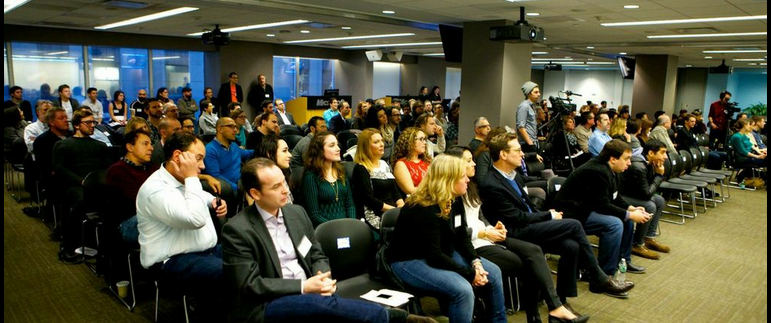 Back to selection
Back to selection
Takeaways From Dogfish Accelerator’s Demo Day

Back in October, Filmmaker spoke with a few of the driving forces behind Dogfish Pictures’ Accelerator Program, which seeks to bring the start-up financing model to independent film production. I’m pleased to report that James Belfer and Company’s months of hard work culminated in a successful Demo Day at the Microsoft Technology Center in midtown Manhattan last Friday.
For myself, and a few others in the audience who aren’t necessarily of the tech-ilk, it was our first brush with this sort of presentation marathon, where one or two representatives from each team take to the floor for with a Powerpoint pitch before investors and industry personnel. Concision and engagement are key throughout the ten minutes, and I was impressed to learn all participants delivered their pitches without the aid of a teleprompter or notecards — though practice, practice, practice seemed a primary ingredient.
Before introducing the eight Accelerator teams, Belfer headed up the afternoon with the exciting news that two of the program’s advisors, Gentile Entertainment Group and Platinum Media Group, had already committed as lead investors to four of the projects. Once the presentations began, more than a few commonalities emerged beyond the tone and style — pithy, with beats for laughs — of each pitch.
Most of the team speakers relied heavily on data to make the case for why their products aimed to fill a void, serve a particular audience, or — more often than not — both. First up was Range Life Entertainment President Michael Melamedoff, who was sure to emphasize why the guerilla marketing company’s practice of catering to college campuses is economically viable. Every year, the college-enrolled spend an average of $1.2 billion on movies, with 84% “evangelizing” brands that reward loyalty, which is exactly what Range Life does with their artillery of perks and parties following each screening. Further, Range Life enjoys multiple revenue streams, from college screening fees, as well as lifestyle and client brands whose products are distributed on campus.
Go Infect Films producer Jessalyn Abbott observed that 40% of millennial spending is on clothing in explaining her team’s decision to create a supplementary fashion line for the release of Like Me, in addition to their graphic novel. Abbott believes that, nowadays, too many films are “being made for millennials, but not by them,” and Go Infect’s plan to monetize their product across brands, much like a franchise would, is forward thinking indeed.
The most surprising statistics perhaps came from Allie Esslinger, founder of Section II, a curated multi-platform network of lesbian content, who noted the gulf in the genre’s supply and demand. Despite 225 queer-related festivals, only 17 films released last year had a LGBTQ character. Moreover, from the audience side of things, one third of women in the US report being homosexually inclined (not necessarily gay, just, not straight), with 31% of heterosexuals enjoying “L” content. Esslinger has calculated that this rather substantial audience is twice as likely to watch queer content than mainstream, which makes for a nice investment prospect.
Another key similarity on display across the presentations was holistic comprehension. Every group had a clear execution plan for every step of the process, from pre-production through marketing and distribution. Jonathan Paley of Guagua Productions, purveyor of subversive documentaries, said that his company’s marketing “begins the day we start a project.” Their brand of content aligns with the political satire of “The Daily Show,” and The Onion, and identifying and facilitating outreach with such audiences is “the key to navigating the crowded marketplace.”
Young Gunner Films’ David Mandel and Noah Lang have already started the ball rolling on pre-orders for their next endeavor Diverge, which won’t even wrap production until next year. Additionally, they have their distribution plan fully in place, through the Gumroad platform. Allowing fans to connect with their products as soon as possible is essential for Young Gunner, as they operate from the brand standpoint of, “if they like the way we do business, they’ll stick around for the next few projects.”
Jessica Caldwell of Wheelhouse Pictures has four, varied films in pre-production, each with its distinct marketing strategy. Caldwell and partner Andrew Hauser are producing Jeremy Teicher’s follow-up to Tall as the Baobab Tree, Tracktown, USA, which will star co-writer Alexi Pappas. Pappas herself is a track star, currently in training for the Rio Olympics, a narrative that Caldwell and Hauser will use to their full advantage surrounding the film’s release. Further down the line, the duo has Original Love, which sounds like Little Odessa, but with medicare fraud in lieu of gangsters, and are planning an agressive pre-sale campaign in Russia. Wheelhouse is unique in that, despite their distinctly melting-pot American stories, they are looking to the grand, international marketplace for maximum returns and eyeballs.
Meanwhile, Zachary Koonce of Auralnauts and Ryan Koo and Zack Lieberman of Exit Strategy are concerned with generating products that an audience can visit and revisit with a new experience each time. Auralnauts, which began as a YouTube channel and achieved viral fame through their Dark Knight Rises Bane mash-up, created soundboard annotation videos to allow for interactive play. Exit Strategy’s Third Rail web series, which they describe as an “Agatha Christie whodunnit in a modern subway setting,” let’s the audience act as the detective. With each episode occurring in real-time over five minutes, and across several different subway cars, Exit Strategy believes audience curiosity will drive them to stitch together as many scenarios as possible — since, if you’re in one car, you’re missing the action in the next. Such a product allows them to combine “the storytelling of feature filmmaking, with the accessibility of casual gaming.” It’s also a great way to get the biggest bang for your buck.
